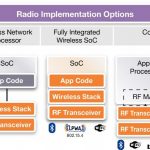CEVA Webinar “Challenges of Vision Based Autonomous Driving & Facilitation of An Embedded Neural Network Platform” will be held on November 16[SUP]th[/SUP] and will address one of the hottest topics today in our industry, probably the hottest in the automotive industry as all the players are working hard on autonomous vehicles.… Read More
Semiconductor Intellectual Property
RRAM Redux
Advanced memory technologies are a perennially hot topic thanks to a proliferation of data-hungry applications pushing our demand for more capacity and performance at less power and area. Among several technology contenders is Resistive RAM or RRAM (also called ReRAM). In this technology a conducting filament is grown through… Read More
New Cortex-M7 Chip to Help Power Sophisticated IoT Solutions
IoT architects face a dilemma in partitioning the compute power of their systems between the cloud and the edge. The cloud offers large storage and heavy duty compute power, making it an attractive place to perform the computation needed for IoT tasks. However, moving large amounts of data from the edge to the cloud servers, can … Read More
The challenge of insecure IoT
An attack on Dyn (a DNS service provider) through a distributed denial of service (DDOS) attack brought down Github, Amazon and Twitter for a while and is thought to have been launched through IoT devices. Hangzhou Xiongmai, a provider of webcams and the most publicly pilloried source of weakness in the attack is now recalling all… Read More
The IP Paradox: Sales are growing despite Semi Consolidation
IPnest is launching the “Interface IP Survey” since 2009, and we did it last September again. To build the survey as accurately as possible, I have followed the “divide and conquer” strategy. Interface protocols are varied, ranging from PCI Express, USB, or Ethernet, to memory controller (DDR3, DDR4, LPDDR3, LPDDR4 and more) … Read More
End-to-End Secure IoT Solutions from ARM
ARM announced today a comprehensive suite of solutions for IoT support, from IP optimized for applications in this space all the way to cloud-based support to manage edge devices in the field. Their motivation is to provide a faster path to secure IoT, from the chip to the cloud. One especially interesting component of this solution… Read More
Emergence of Segment-Specific DDRn Memory Controller
The semiconductor industry is served today by memory devices supporting various protocols, like DDR4, DDR3, LPDDR4, LPDDR3, GDDR5, HBM, HMC, etc. The trend is clearly to define application specific memory-protocols and in some cases, application specific devices. But developing many, and different, memory controllers … Read More
Webinar on Revolutionary Changes in SOC IP Access
Knowledge is power, and I’ve seen the trend over time of people getting more and deeper access to knowledge as each year goes by. I remember, as a student in high school back the in 70’s, the first time I wanted to buy stock in a company. You could only get a quote by calling a broker or visiting the broker’s office. Today you can get real … Read More
Why Integrate Bluetooth LE IP in a Single Wearable SoC?
Did you know that, in over 800 teardowns of mobile and wearable products from 2012 to 2015, wireless chips outnumbered the actual number of products, indicating multiple wireless ICs in some designs ([SUP]1[/SUP])? It could be interesting to look at the advantages of integrating wireless technology such as Bluetooth low energy… Read More
S2C adds support for Juno ARM dev platform
We’ve had several blogs introducing the Juno ARM Development Platform as a vehicle for ARMv8-A software development. S2C has jumped in with a module connecting their FPGA-based prototyping platform to the Juno, enabling more advanced IP… Read More




Website Developers May Have Most to Fear From AI